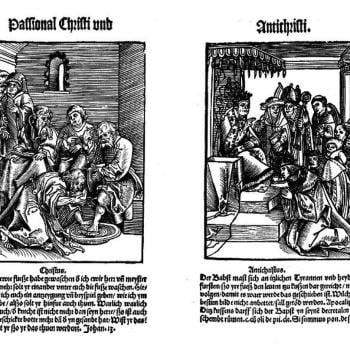I just wanted to take a moment to thank you so much for your comments about the Rep Stage production of the play. I’m so glad — relieved! — that you enjoyed it and found it worthwhile, especially given your background and area of expertise.
I also wanted to address some of your questions/concerns, to at least explain what my intentions were with the specific issues you raise. Working in the theatre can sometimes be like playing in a hall of mirrors, with the playscript reflected in the specific production reflected in the given performance before a particular audience — ultimately every audience member brings his own constructivist context into the theatre with him and walks out with his own personal reaction/interpretation — but I can tell you what I was thinking when I wrote the damned thing, for what it may be worth.
Regarding Faustus’ fate at the end of the play, I looked at it like this: Luther is an actual person, Hamlet is a literary character, but Faustus is in many ways primarily an archetype. Accordingly, Luther’s fate is determined by history and Hamlet’s by the conclusion of Shakespeare’s play, but depending on whether you read Marlowe or Goethe (to pick the two preeminent versions of the legend) Faustus is either damned or redeemed, respectively. I liked that ambiguity, that uncertainty, and wanted to leave some of it in place for the audience to decide Faustus’ ultimate disposition for themselves (choice, after all, being one of the main concerns of the play).
The Song of Songs section is there to depict Luther and Faustus each in communion with their respective conceptions of the divine: Luther’s a spiritual loving God and Faustus’ the ecstatic consummation of carnal union with the woman he loves. The dual scene is also an illustration of the play’s concern with hermeneutics (e.g., Luther’s interpretation of Paul, or the various interpretations of Hamlet’s dream). Luther posits the traditional interpretation of The Song as an allegory of Christ’s love for His church, where the Faustian interpretation takes the text literally as an expression of erotic desire. (Granted, Benedict splits the difference in Deus Caritas Est, but that’s just under 500 years too late for the purposes of the play.) I make it a point not to compare different productions of the play and their various interpretative solutions, but I will concede that the depiction of the scene in this particular iteration could come off as a little over the top for some audiences. It’s always a balancing act.
I actually encountered Rheticus very early in my research, and it was in fact his relationship with Copernicus that first suggested to me the use of heliocentrism as a central issue in the play. But, as you note, Luther’s attitude to the theory was not quite so accepting.
But enough about me. I’ve taken the liberty of enclosing a copy of the play for your perusal. Should you have any other questions/comments, I would be very interested to hear them.
Again, Gene, thank you for taking the time to see the show and for your generous evaluation of the experience.
Best,
David
I’ll post my reply next time.












